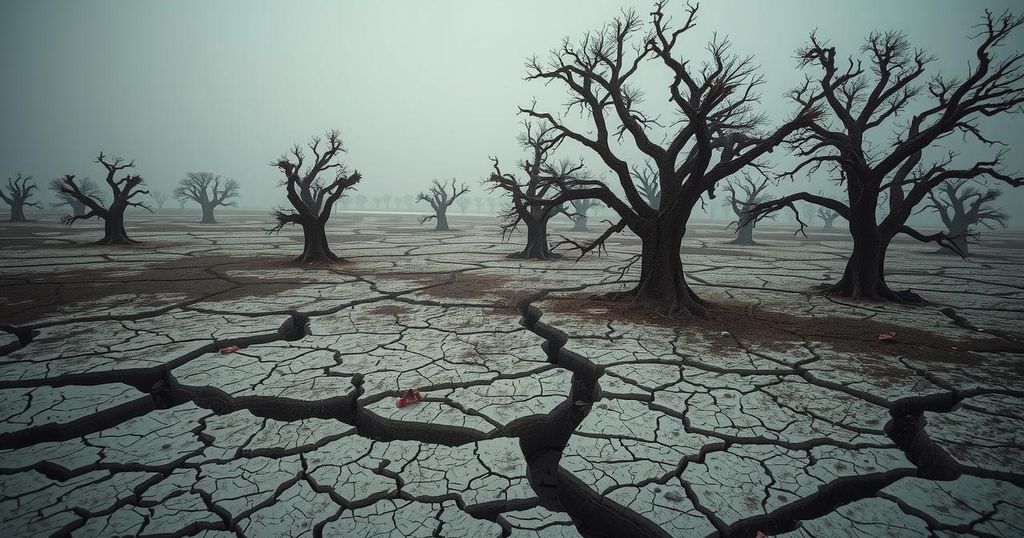UN rights chief Volker Türk has raised alarming concerns regarding the escalating violence in eastern DRC linked to the M23 offensive, calling for immediate international intervention. Nearly 3,000 people have died since the offensive intensified at the end of January, with serious human rights violations reported. The situation has prompted discussions of establishing a fact-finding mission. Both national and international stakeholders highlight the urgent need for humanitarian assistance and accountability for ongoing abuses.
The UN human rights chief, Volker Türk, has expressed grave concerns regarding the escalating violence in eastern Democratic Republic of the Congo (DRC), primarily due to the Rwanda-backed M23 offensive. Türk warned that if the situation is left unchecked, the consequences for both the region and beyond could be dire, stating in a recent session of the Human Rights Council in Geneva, “If nothing is done, the worst may be yet to come,” for the local populace and neighboring areas.
Since January 26, violent clashes have led to nearly 3,000 fatalities and over 2,800 injuries, with heavy weaponry utilized in civilian areas. The UN considers the establishment of a fact-finding mission to examine severe human rights violations in the North and South Kivu provinces, regions plagued by armed militia strife for decades. The M23, predominantly comprised of Tutsi fighters, has further intensified hostilities by taking control of significant territories, notably areas around Goma.
Moreover, the situation has resulted in tragic events such as the bombing of hospitals and a mass prison break which led to the rape and death of numerous female detainees. Türk has decried the pervasive sexual violence that has become a distressing characteristic of this ongoing conflict, foreseeing an escalation in such acts under the present circumstances. UN personnel are actively verifying reports of grave deficiencies in human rights.
Bintou Keita, the UN’s Special Representative in the DRC and head of the MONUSCO peacekeeping mission, characterized the current circumstances as “catastrophic.” Keita highlighted ongoing forced recruitments among youth and threats faced by human rights advocates and journalists. She emphasized the alarming health risks arising from the conflict, including the resurgence of cholera and malnutrition among children due to disrupted education and humanitarian access.
Patrick Muyaya Katembwe, DRC’s Minister of Communications, condemned the external support, particularly from Rwanda, for armed factions within the country, asserting that such involvement has dramatically exacerbated violence tied to the exploitation of the DRC’s mineral wealth. Conversely, Rwandan Ambassador James Ngango responded by warning of an imminent large-scale attack against Rwanda, alleging that weapons from the DRC’s government pose a direct threat to Rwanda’s security.
Mr. Türk reiterated the need for collective international action against the ongoing conflict. He stressed that the adverse conditions affecting the DRC’s eastern population are linked to the global demand for minerals sourced from the region, underscoring a shared global responsibility. “We are all implicated,” he remarked, urging for greater awareness of the underlying political and economic issues contributing to the crisis.
The ongoing conflict in the eastern Democratic Republic of the Congo has historical roots in regional instability, exacerbated by foreign intervention and local militias. The M23 group, which is supported by Rwanda, has emerged as a significant actor in the violence, leading to increased human rights violations and a humanitarian crisis. The DRC, being rich in mineral resources, has attracted both international interest and exploitation, complicating the local political landscape and contributing to prolonged conflict. The United Nations has continually sought to address these issues through intervention and support for human rights initiatives, yet challenges persist amid escalating violence and humanitarian needs.
The crisis in eastern DRC continues to worsen, with grave implications for human rights and regional stability. International action is urgently needed to alleviate the suffering of civilians and to hold accountable those perpetuating violence. The conflict’s ties to global consumption of minerals emphasize the necessity for a more sustained and collaborative international approach. Without such efforts, conditions are likely to deteriorate further, impacting not only the DRC but neighboring countries.
Original Source: news.un.org






